Our favourite places to stay on this sleepy Cebu island.
Underrated Northern Luzon Destinations Worth the Road Trip
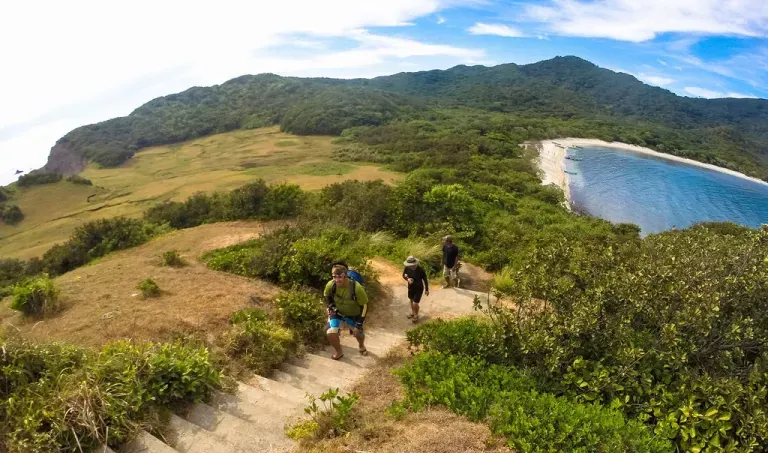
Ask questions like “Where to go if I visit Luzon?” or “Where are the nearby places I can go to escape Manila?” and each Filipino would have a few ready answers in mind. Many of the better-known places are swarmed by tourists and locals alike. But take the time to explore these underrated Northern Luzon destinations for an enriching experience during your road trip.
Also read: Your Ultimate Survival Guide for Long Road Trips
Ilocos Norte
Kabigan Falls
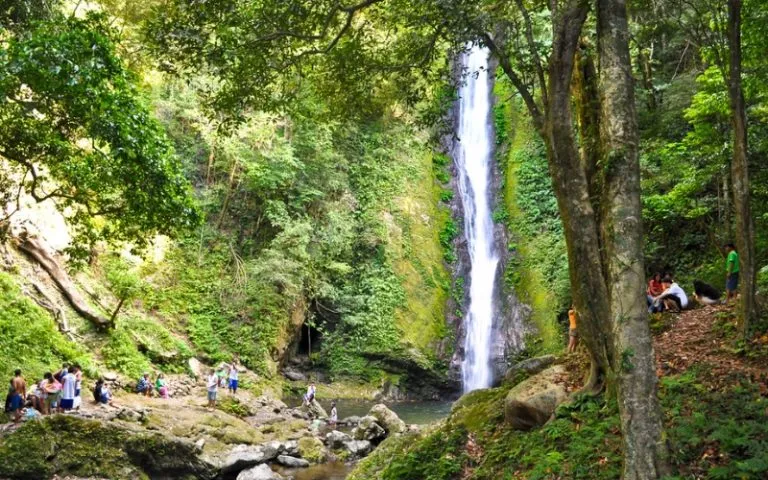
This enchanting waterfall’s name literally means “friend” in English. The name comes from the belief that the 120-foot-drop falls and the river it flows onto are “friends.”
Located just a 10-minute drive from Pagudpud, the waterfall sits in a place known for its white sand beaches. But the drive marks only the start of the journey. To get to the falls, visitors must trek a kilometre-long stretch from the entrance for about 30 minutes. The trek is never boring, especially for anyone who loves to be one with nature. A great view of the woodlands, terrains, boulders, streams, and various wooden bridges awaits its guests.
Also read: 10 Waterfalls Near Manila for Day Trips & Long Weekends
Do not worry, for there is already an established path to follow to reach the majestic falls. It is still highly encouraged to have a local guide with you to avoid any incidents of getting lost. There is also a conclave basin where, after trekking, visitors can take a dip and enjoy the cold water.
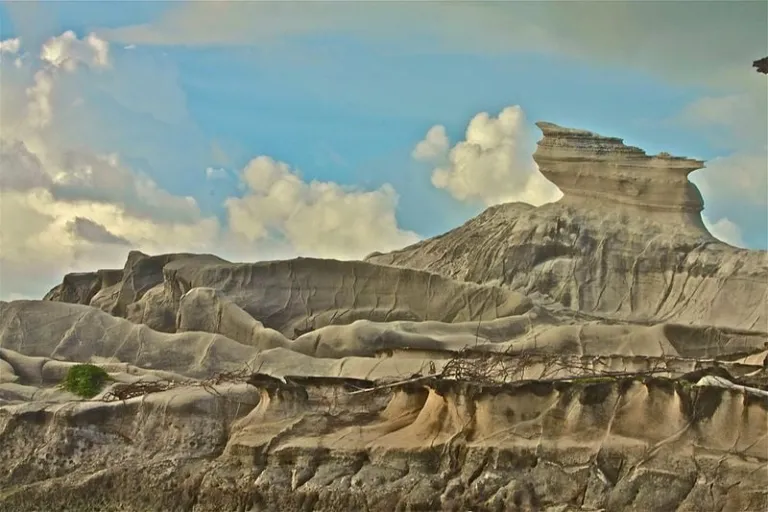
Rock formations take shape as time passes, but these beautiful formations give an unearthly vibe. In Burgos, Ilocos Norte, a rock formation, majestic and white, called can be found.
The beautiful rock formation towers on the coast of Burgos, fronting Bangui Bay. Anyone who visits this place will be mesmerised both by Kapurpurawan and the surrounding view of the sea. This natural sculpture got its name from the Ilocano word “puraw,” which means white. You can more easily see its unique hue in broad daylight when the sun kisses the rocks.
To reach the rock formation, one has to either go through a three-kilometre trek or ride a horse to get up close for a minimal fee.
Cagayan
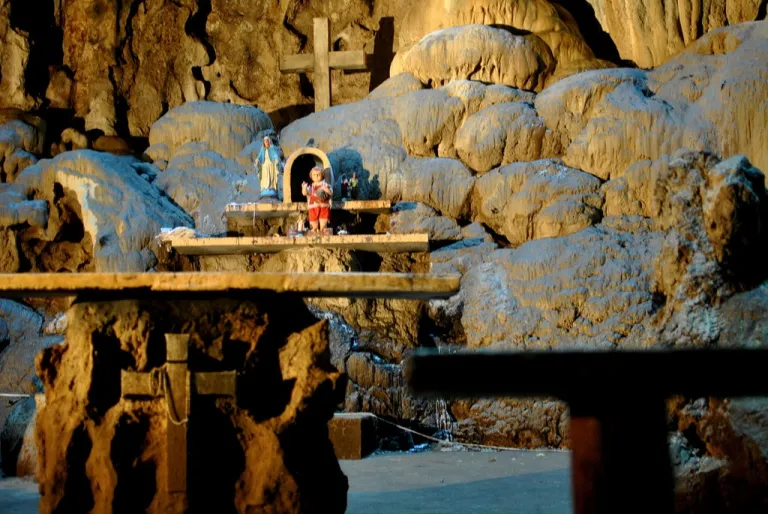
This jaw-droppingly beautiful cave is one of the best Northern Luzon destinations to explore. Many who have visited this place were left speechless by what they’ve seen and experienced. Brides-to-be also happen to wish for this beautiful cave. You can find in the municipality of Peñablanca, northeast of Tuguegarao City, in Cagayan province.
Known for the natural lighting that filters in from naturally made crevices and holes, this cave does not boast stalagmites or stalactites; instead, a small church can be found. When sun rays strike the cracks of the cave, they illuminate the altar, as well as the rows of pews, giving the place a golden and holy glow. Dotted with natural holes, the cave’s ceiling projects a beautiful skylight into the chamber.
Not only is this cave something to behold, but it is also rich in history. is where the oldest remains of a fossilised Homo Sapiens, said to be about 67,000 years old, were found.
As some say, before you get a reward, you have to work hard. This holds true, and the cave does not disappoint. You must drive about an hour from Tuguegarao City to reach the cave. Once in Resort, a long wooden boat awaits visitors, who have to sail through the Pinacanauan River. The short ride is very serene. To get to the mouth of the cave, you have to go through an uphill battle. To reach the top, it will take about 184 steps. Do come prepared.
Then again, after the arduous journey, the golden-lit chambers of the cave await.
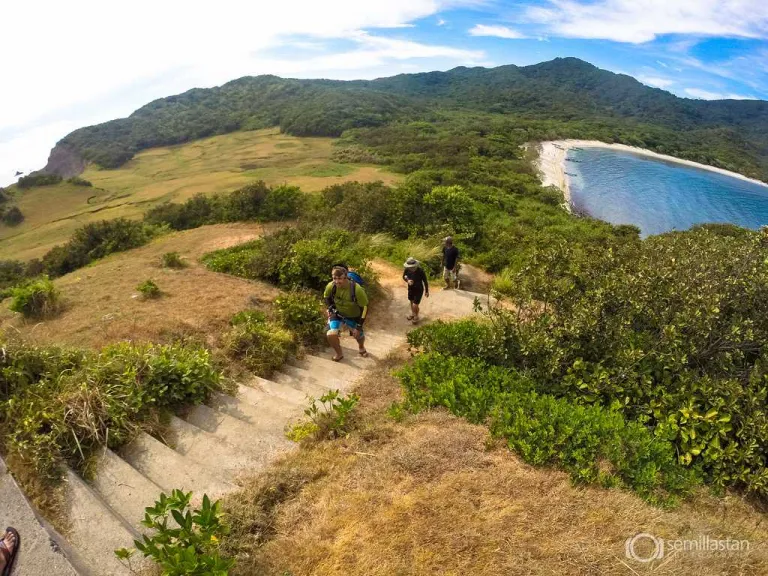
This National Marine Reserve sits in Sta. Ana, Cagayan. Often overlooked, this beautiful island has no resorts or hotels because of its status as a marine reserve. You can’t have glamping here, either; just plain old camping. Alternatively, you can book a homestay with the locals — enriching as it is fun.
The island is only about 10km long and 5km wide. Visitors can take in breathtaking views of the Pacific Ocean, forests and hills. This island is truly an escape from the hustle and bustle of the big city. The rawness of the beauty is something worth experiencing.
Calayan Island
A small island gem sits off the Strait of Luzon in Cagayan province. To see this island requires 18 hours of total travel by land and sea is one hell of a commitment. Travelling to Calayan Island would mean souvenirs of more than pictures but the thrilling trekking and climbing experience. Prepare yourself before embarking, this is one of the most strenuous Northern Luzon destinations that travellers can visit. It is also one of the most rewarding!
The island has some accommodations, most of which are cabins by the sea. If one is attached to technology and the comforts of air-conditioned rooms, there is still time to back out from the trip, as the island only has electricity from 12 noon to midnight. You won’t have access to the Internet (except for mobile phone data) or TV here. But, take this as a great opportunity to be one with the island.
Bangaan Hills and Malansing Falls
Visitors can enjoy plenty of places on Calayan Island. First off is the stretch of land where Bangaan Hills is located. Trek to the top and enjoy the expansive ocean view and the horizon. Remember to visit Malansing Falls, where a beautiful rainbow forms over the dripping water. This is a natural phenomenon that clearly is mesmerising.
Sibang and Caniwara Coves
Sibang Cove is tucked away to offer a place where visitors can experience being one with nature. Once there, worries are forgotten and replaced by the adrenaline rush that comes with discovering the wonders of nature. Just beside Sibang is Caniwara Cove, which is also a spotless paradise. It has a rugged coastline, so visitors should note the danger of going and traversing the shoreline alone.
Life is a beach in this part of the Philippines. The coves present the possibility of enjoying the beach without the noise and bustle of many tourists scrambling to get a great spot.
Pangasinan
Hundred Islands National Park
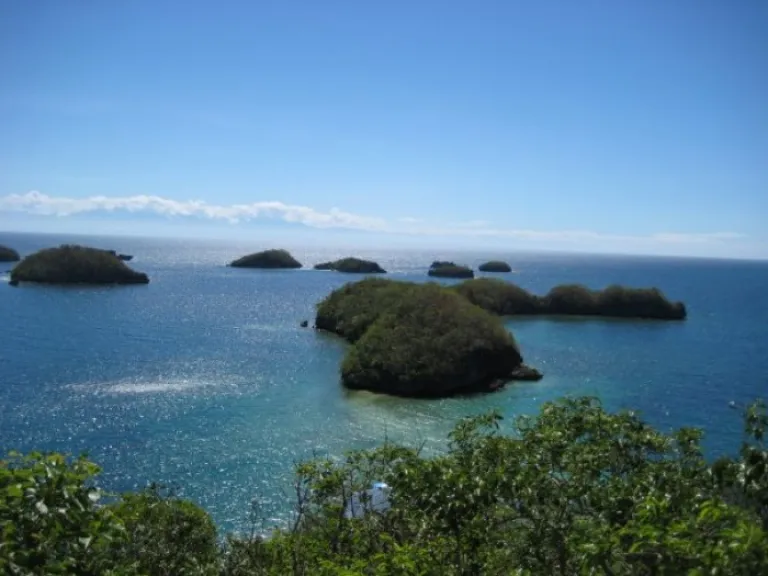
Within Pangasinan lies a protected area in Alaminos that is gaining traction in the travel sphere. This group of islands is yet to be conquered by wanderlusts, despite being featured in many videos promoting the Philippines.
When we talk about Northern Luzon destinations, we can’t forget about Hundred Islands! This group of islands comprises 124 islands during low tide and 123 during high tide. There are many spots to explore, like the secret lagoon at Shell Beach, Camantiles Island or the caves that pepper the clusters. Visitors can go bird watching or snorkel the day away.
The islands are about two million years old, according to archaelogists. This part of an ancient sea bed became a national park under President Manuel L. Quezon in 1940. With the lush flora and fauna, the five-hour drive from Manila is definitely worth it.
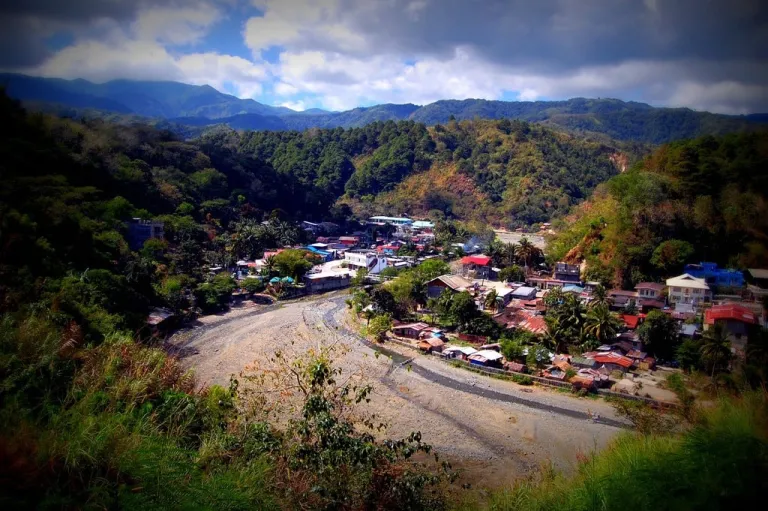
Situated 268 kilometres north of Manila, prides itself as the “Citrus Capital of the Philippines” for its oranges and honeydews. But recently, tourists dub the province as a popular destination for outdoor enthusiasts and environmentalists. It is 70% forestland strategically bound by three mountain ranges: Sierra Madre, Cordillera, and Caraballo.
This place may be too sleepy for some, but it is rich in history that many have already forgotten. Take the time to visit this lovely province, and you might find yourself a lovely addition to the Northern Luzon destinations itinerary.
Also read: 15 Farm Stays in the Philippines for a Nature Escape
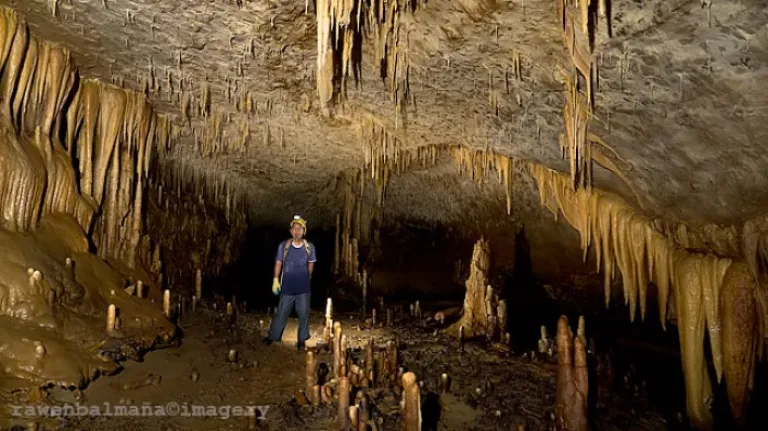
At 4.2 kilometres long, this cave in Malabing Valley in Kasibu, , is vast and has some rare calcite formations. Just like the famous new wonder of the modern world in Palawan, it also has a subterranean river that serves as a passageway for visitors. The cave exits to a different cave system called Lion-Alayan Cave, an excellent site for spelunking and a place to experience the intriguing species that inhabit the area.
Church of San Vicente Ferrer and St. Dominic Cathedral
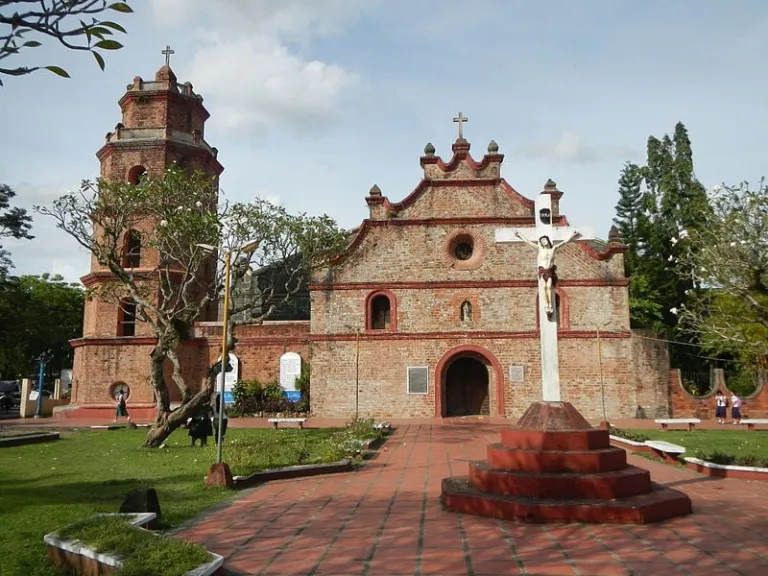
These picture-perfect churches date back to the 17th and 18th centuries. San Vicente Ferrer was built by the Dominicans in the latter half of the 18th century and was declared a National Cultural Treasure for its well-preserved complex. Photography enthusiasts will have a field day in this place, not only the old buildings but also the acacia trees surrounding them. For a bit of history trivia, the acacia trees date as far back as the 1880s.
The red brick St. Dominic Cathedral is truly a gem of the old town. Built in the 17th century, two fires razed the building down. It was rebuilt, and the beautiful facade was preserved.
La Union
La Union is usually associated with its lively beach culture, making it one of the most popular Northern Luzon destinations recently. But this humble province offers more than the beach bum life. Take the time to explore La Union, and it might prove to be the most laid-back but enlightening part of a northern Luzon road trip.
Ma-Cho Temple

There is a good number of Taoist temples founded in the Philippines. One of the most notable is dedicated to Mazu, the goddess of the sea. If Ma-Cho Temple’s founders intended to erect this five-storey temple in La Union since it’s close to the sea, it is pleasantly serendipitous.
Entrance to the temple is also free, so visitors can enjoy most of the attractions here without spending at all. Regardless of belief, Ma-Cho Temple can be a sanctuary for anyone who wishes it to be. No one can say no to a sanctuary among Northern Luzon destinations.
Gapuz Grapes Farm
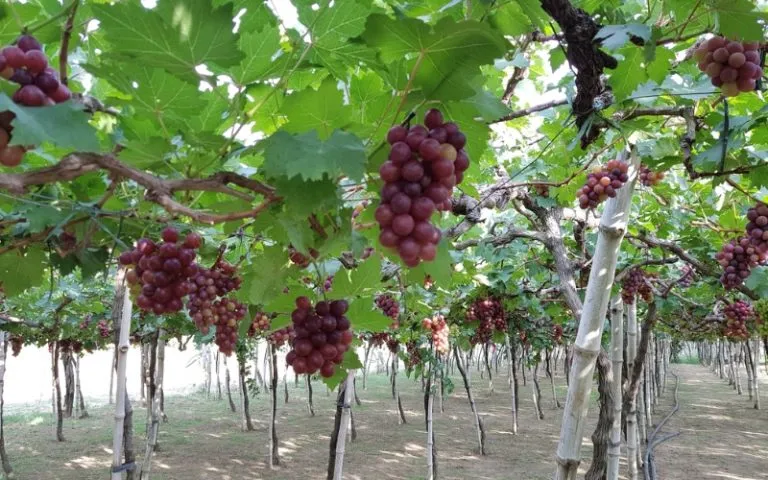
Fruit lovers will definitely get a kick out of visiting Gapuz Grapes Farm in San Juan. Picking out fresh grapes from a vineyard and immediately eating it right after has to feel like bliss! The farm also offers a lot of ways to enjoy these grapes. For one, this vineyard sells wine made from fresh grapes; they also offer sinigang na tilapia sa ubas!
Be sure to visit the farm during the summer, after February. Their grapes tend to thrive under the heat of La Union, but don’t worry, the vines protect people from the sun, acting as a natural canopy.
Isabela
San Pablo de Cabigan Church Ruins

Ruins, while pretty to look at, scream stories without having to say anything. They pique curiosity effortlessly, which draws tourists in turn.
Even at a glance, the San Pablo de Cabigan Church Ruins is strangely inviting. Before its dilapidated state, this church thrived within its local community. It was also a refuge for weary travellers who came across the church. It sustained damages during the Japanese Occupation and a massive earthquake which only intensified its deterioration. Today, a community church integrated itself into the church’s remains for locals to conduct mass.
Giant Butaca
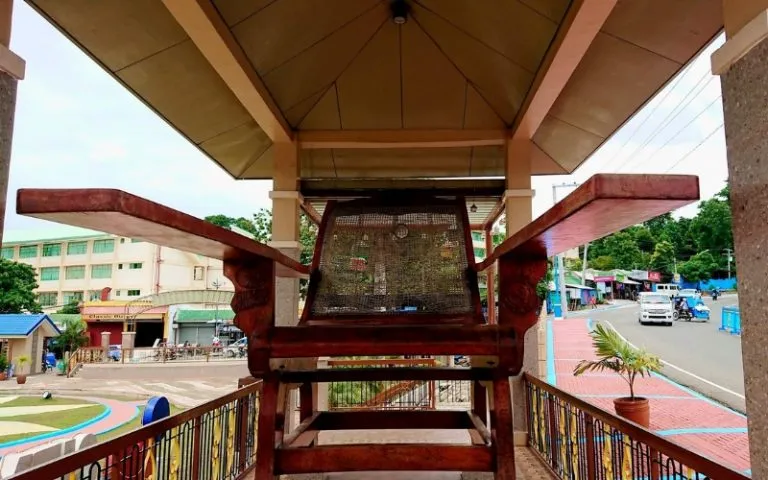
Many attractions are born out of left-field ideas. For a real spectacle, however, visitors can stop by and take a photo of the Giant Butaca in Ilagan. As the name implies, this is a massive version of the Filipino household staple from the old days, where mothers or grandmothers would usually rock the chair to sleep. The furniture makers of Ilagan crafted the giant chair to honour their industry of creating strong and sturdy furniture.
Benguet
Atok

Tired of going to Baguio, Tagaytay, or Sagada to escape the summer heat? Maybe Atok in Benguet can help. This Northern Luzon destination is famous for its incredibly cold weather and breathtaking views of the Cordillera Mountain Range. While it is a pretty far drive, it offers fresh mountain air that makes the trip worth it.
When in Atok, make sure to hike to the Northern Blossom Flower Farm. This farm hosts many species of flowers that thrive in Atok’s cold weather. And with many species of flowers come many colours that provide some of the most gorgeous visuals in the Philippines — just idyllic while revelling in the comfort of cold weather!
Also read: Central Luzon Destinations: 10 Tourist Spots You Can’t Miss
That’s it! Now, grab your friends and start your unforgettable getaway to these underrated Northern Luzon destinations. Happy trip!
Published at
About Author
James Aquino
Subscribe our Newsletter
Get our weekly tips and travel news!
Recommended Articles
10 Bantayan Island Resorts, Hotels, and Rentals for Your Tropical Escape 14 Best Credit Cards for Travel in the Philippines The only plastic we need for travel.
10 Best Mountain Cafes in the Philippines for Your Peak Coffee Experience Coffee date on the mountains, anyone?
10 Commandments for Responsible Travel Flexing Spread the good word!
10 Fairytale Castles In Europe Filipinos Need To See! Permission to feel like royalty even for a day?!
Latest Articles
Scoot’s Direct Flights from Singapore to Iloilo Are Finally Here — Here’s What You Need to Know Fly direct from Singapore to Iloilo with Scoot!
Cheung Chau Bun Festival 2025: Where to Go, What to Do, and How to Join Experience the thrill of the Cheung Chau Bun Festival 2025
New Theme Parks in Southeast Asia for Filipino Travellers Upcoming theme parks worth visiting
5 Must-Visit Family-Friendly Mountain Peaks in the Philippines Swap the mall for these family-friendly mountain peaks!
Mango Ranch Waterpark: Negros Oriental’s Hottest New Attraction Make a splash at Negros Oriental’s newest adventure hotspot!

